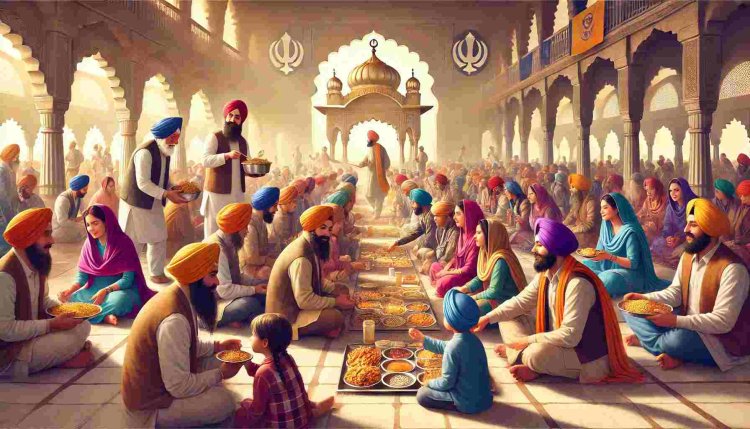How Sikhism Promotes Equality and Social Justice?
Discover how Sikhism fosters equality, compassion, and social justice through its teachings, promoting fairness and unity for all.
Share this Post to earn Money ( Upto ₹100 per 1000 Views )

Sikhism, a monotheistic religion that originated in the Punjab region of India in the late 15th century, emphasizes a deep commitment to equality and social justice. Established by Guru Nanak Dev Ji and shaped by ten successive Gurus, Sikhism offers a progressive approach to addressing issues of inequality, discrimination, and social injustice.
Enjoy the divine experience of Shabad Kirtan from anywhere with online access to soulful Sikh hymns. Listen to the sacred Gurbani, immerse yourself in peace, and connect with Waheguru's teachings through beautiful renditions available online for spiritual reflection and inner tranquility.
The teachings of Sikhism not only guide followers in their personal lives but also advocate for creating a just and equal society for all. In this article, we will explore the core principles of Sikhism that promote equality and social justice, and how these teachings have shaped Sikh communities and their global impact.
The Foundational Teachings of Guru Nanak
At the core of Sikhism lies the belief in one God, who is formless, timeless, and omnipresent. Guru Nanak Dev Ji, the founder of Sikhism, emphasized that God created all humans as equals, regardless of their race, caste, gender, or social status. This revolutionary message challenged the deeply entrenched societal norms of the time, which were largely defined by the rigid caste system and the marginalization of certain groups.
Guru Nanak’s teachings laid the foundation for the Sikh commitment to equality. He believed that all people, irrespective of their social backgrounds, have the same divine spark within them. Guru Nanak expressed his message of equality in simple but profound words, famously stating: “There is no Hindu, there is no Muslim.” With this, he rejected religious and social divisions and urged his followers to see beyond labels and distinctions, fostering a sense of unity among all people.
Equality in the Guru Granth Sahib
The Guru Granth Sahib, the central religious scripture of Sikhism, plays an instrumental role in advocating for equality and social justice. It contains hymns (known as "Gurbani") by the Sikh Gurus, as well as writings by various saints and scholars from different religious and cultural backgrounds. These hymns reinforce the idea that all people are equal in the eyes of God, irrespective of their birth, occupation, or societal position.
One of the key teachings in the Guru Granth Sahib is the concept of "Naam Japna" (meditation on the name of God) and "Kirtan" (devotional singing), which can be performed by anyone. There is no discrimination on the basis of caste, creed, or gender when it comes to the practice of spirituality. In fact, the scripture denounces the caste system and the practice of untouchability, which were prevalent in the Indian subcontinent during the time of the Gurus.
Rejection of the Caste System
One of the most significant ways Sikhism promotes equality is by rejecting the caste system. The caste system, which was a deeply ingrained social structure in India, dictated one’s occupation, social relationships, and overall status in society. In Sikhism, however, there is no room for caste-based discrimination. All individuals are seen as equals, and this belief is deeply rooted in the teachings of the Gurus.
Guru Nanak, who was born into a society rigidly divided by caste, strongly denounced the discrimination associated with it. He rejected the concept of untouchability and called for a more inclusive society, where individuals are valued for their character and devotion to God rather than their social status. Guru Nanak’s stance was clear when he stated:
"The one who is born in a low caste, or the one born in a high caste, is the same. It is the same God who resides in both."
This message was revolutionary, as it challenged centuries-old social structures and called for a more egalitarian approach to society. Throughout Sikh history, the Gurus continually emphasized the importance of community and the rejection of caste-based divisions.
Experience the soothing and divine Gurbani Kirtan online at Shabad Guru. Delve into the peaceful hymns of Gurbani, accessible anytime, and enrich your spiritual journey. Let the sacred verses bring calm, inspire reflection, and connect you with the timeless teachings of the Gurus.
Gender Equality in Sikhism
Another powerful aspect of Sikhism's commitment to equality is its progressive stance on gender. In the patriarchal societies of the 15th and 16th centuries, women were often relegated to subservient roles. Sikhism, however, presents a radically different view of women, placing them on equal footing with men in both spiritual and social matters.
Guru Nanak, in his teachings, explicitly stated that both men and women are equal in the eyes of God. He emphasized that women are equally capable of devotion, spiritual enlightenment, and righteousness. The Guru Granth Sahib contains numerous references to the equality of women, reinforcing the idea that women should not be treated as inferior to men.
The Concept of Langar: Promoting Social Justice
Langar, the community kitchen, is one of the most visible symbols of Sikhism’s commitment to equality and social justice. Established by Guru Nanak, Langar serves as a place where people of all backgrounds, regardless of their religion, caste, or social status, can come together to share a meal. It is a practice rooted in the principles of selfless service (seva) and humility.
Langar serves as a reminder that everyone deserves to be treated with dignity and respect, and no one should go hungry or be marginalized due to their social position. The practice of Langar also emphasizes the importance of equality in Sikhism. When sitting down for a meal in the Langar, everyone, regardless of their background or status, eats together from the same food. This communal aspect promotes unity and breaks down the divisions of caste, class, and gender.
Sikh Contributions to Social Justice Movements
Throughout history, Sikh communities have been active participants in social justice movements. From the time of the Gurus to the present day, Sikhs have fought against oppression, inequality, and injustice. The teachings of Sikhism have inspired countless individuals to stand up for the rights of the marginalized and oppressed.
For example, during the colonial period in India, Sikhs played a key role in the Indian independence movement, where they fought for the rights of all Indians, regardless of their religion or social background. In more recent years, Sikh organizations around the world have been at the forefront of advocating for human rights, racial equality, and social justice.
Conclusion
Sikhism is a religion deeply rooted in the principles of equality, justice, and social harmony. From its very inception, Sikhism has championed the idea that all people are equal in the eyes of God, regardless of caste, gender, or social status. The teachings of Guru Nanak and the other Gurus have played a transformative role in challenging societal norms and promoting a just and equitable world.

















